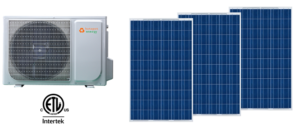In ruling NY N324243 (March 8, 2022), Customs and Border Protection (CBP) discussed the tariff classification of solar powered condenser units from China. The AC condenser units are described as solar condenser units. The 2-, 3-, and 5-ton condenser units are designed to be paired with an air handling unit for the purpose of either cooling residences or for both cooling and heating residences. They feature an outer housing, a compressor, a heat exchange component, and a fan/motor assembly. The units that are used for both heating and cooling also come with heat pumps. The condenser units arrive incomplete such that, once imported, a filter, a solar panel, a Variable Frequency Drive, pressure sensors, and additional electrical controls that operate the condenser units are installed onto the condenser units.
For its classification, CBP first turned to General Rule of Interpretation (GRI) 1 of the Harmonized Tariff Schedule of the United States (HTSUS) and determined that the condenser units cannot be classified solely based on GRI 1. As such, CBP next turned to GRI 2(a), HTSUS, which states that “any reference in a heading to an article shall be taken to include a reference to that article incomplete or unfinished, provided that, as presented, the incomplete or unfinished article has the essential character of the complete or finished article. It shall also be taken to include a reference to that article complete or finished (or falling to be classified as complete or finished by virtue of this rule), presented unassembled or disassembled.
CBP determined that, as imported, the incomplete condenser units still have the essential character of the complete condenser units. In addition, because the condenser units serve the purpose of either cooling or both cooling and heating, CBP determined that there are two different subheadings. The applicable subheading for the condenser unit that completes an AC system that cools and heats is 8415.90.8065, HTSUS, which provides for “air conditioning machines, comprising a motor-driven fan and elements for changing the temperature and humidity, including those machines in which the humidity cannot be separately regulated; parts thereof: Parts: Other: Other: Of heat pumps.” The general rate of duty is 1.4% ad valorem.
Alternatively, the applicable subheading for the condenser unit that completes an AC system that cools is 8415.90.8085, HTSUS, which provides for “air conditioning machines, comprising a motor-driven fan and elements for changing the temperature and humidity, including those machines in which the humidity cannot be separately regulated; parts thereof: Parts: Other: Other: Other.” The general rate of duty is also 1.4% ad valorem.
Additionally, pursuant to U.S. Note 20 to Subchapter III, Chapter 99, HTSUS, Chinese products under subheadings 8415.90.8065 and 8415.90.8085, HTSUS, unless specifically excluded, are subject to an additional 7.5% ad valorem duty rate. As such, the chapter subheading 9903.88.15 must be reported in addition to subheadings 8415.90.8065 and 8415.90.8085, HTSUS.